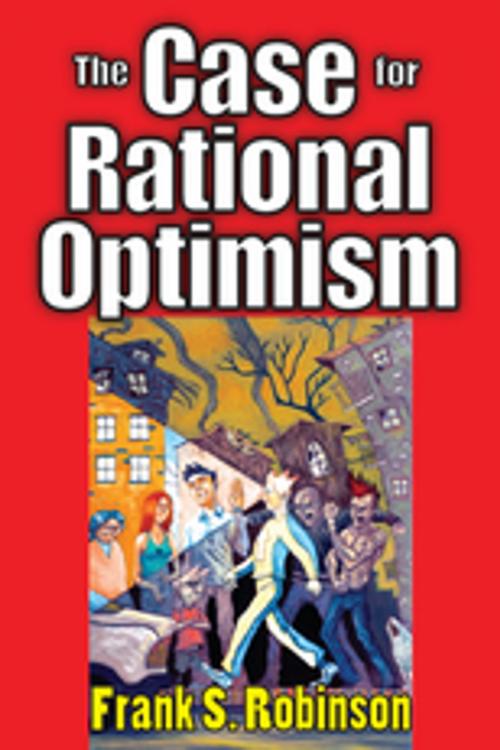| Author: | Frank Robinson | ISBN: | 9781351485494 |
| Publisher: | Taylor and Francis | Publication: | July 28, 2017 |
| Imprint: | Routledge | Language: | English |
| Author: | Frank Robinson |
| ISBN: | 9781351485494 |
| Publisher: | Taylor and Francis |
| Publication: | July 28, 2017 |
| Imprint: | Routledge |
| Language: | English |
The Case for Rational Optimism tackles a host of challenging subjects in an engaging, accessible, down-to-earth style. It is intellectually serious, ceaselessly intriguing, and devoid of banalities. While other books in this genre tend to be oriented toward self-help, this volume brings evolutionary biology, neuroscience, psychology, sociology, economics, and a keen sense of history to the topic.
Robinson begins with three goals: making the case for feeling good about oneself, about humanity in general, and about the global situation. He addresses such seemingly disparate subjects as selfi shness versus altruism, mind and free will, human nature, and issues relating to economics, technology, the environment, and more. Unifying these ideas into a coherent philosophical whole are central concepts: evolution has endowed our species with more good qualities than bad, and why; those qualities, and our use of reason, are the foundations of civilization, and how; and, consistent with our nature, we make a better world by valuing human life therefore enabling others to fl ourish in ways they freely choose.
The Case for Rational Optimism argues that the highly challenging conditions confronting early man created a Darwinian selective pressure for cooperation, even altruism, among members of a tribe. Th e author fi nds evidence for this in the way our brains work, and in observable human behavior. He argues against existential despair over the human condition. Even though there probably is no grand celestial design investing life with meaning, he considers this liberating, giving every person the freedom to craft their own meaning. To Robinson, whether sentient beings experience suff ering or joy is the only thing that matters; without emotive highs and lows, the Universe would hardly matter.
The Case for Rational Optimism tackles a host of challenging subjects in an engaging, accessible, down-to-earth style. It is intellectually serious, ceaselessly intriguing, and devoid of banalities. While other books in this genre tend to be oriented toward self-help, this volume brings evolutionary biology, neuroscience, psychology, sociology, economics, and a keen sense of history to the topic.
Robinson begins with three goals: making the case for feeling good about oneself, about humanity in general, and about the global situation. He addresses such seemingly disparate subjects as selfi shness versus altruism, mind and free will, human nature, and issues relating to economics, technology, the environment, and more. Unifying these ideas into a coherent philosophical whole are central concepts: evolution has endowed our species with more good qualities than bad, and why; those qualities, and our use of reason, are the foundations of civilization, and how; and, consistent with our nature, we make a better world by valuing human life therefore enabling others to fl ourish in ways they freely choose.
The Case for Rational Optimism argues that the highly challenging conditions confronting early man created a Darwinian selective pressure for cooperation, even altruism, among members of a tribe. Th e author fi nds evidence for this in the way our brains work, and in observable human behavior. He argues against existential despair over the human condition. Even though there probably is no grand celestial design investing life with meaning, he considers this liberating, giving every person the freedom to craft their own meaning. To Robinson, whether sentient beings experience suff ering or joy is the only thing that matters; without emotive highs and lows, the Universe would hardly matter.















